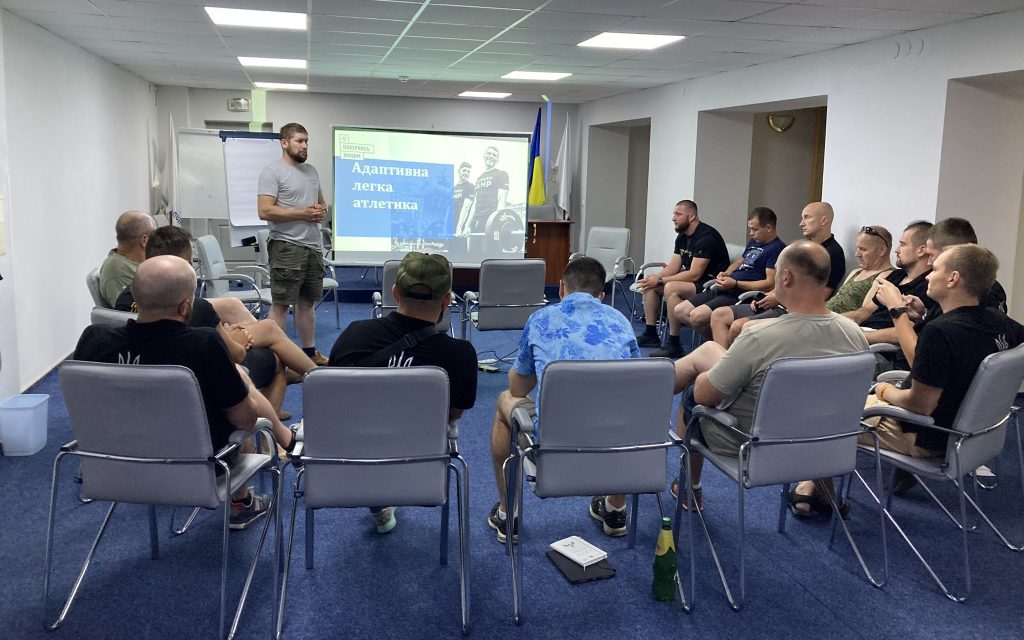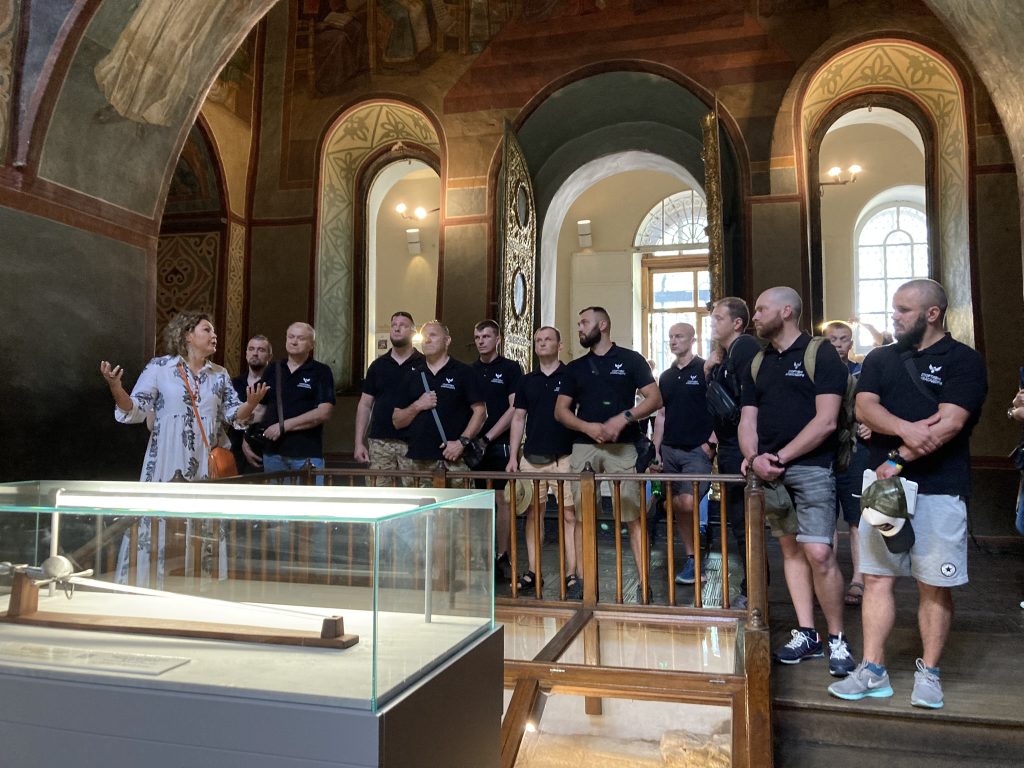"They will establish a movement that will become a powerful tool for veterans' rehabilitation"

The Come Back Alive team has implemented the second and third stages of training for the participants of the SportAmbassadors project.
On 19-20 July, the veterans attended the first part of the course on leadership and mentoring taught by Natalia Kryvda, Doctor of Philosophy and Professor of the Department of Ukrainian Philosophy and Culture at the Kyiv National University, Academic Director of MBA programmes at Edinburgh Business School, and a Come Back Alive volunteer. The next three days were spent on first aid training. It was conducted by a practical psychologist Tatyana Rudenko and a psychiatrist from the NGO Free Choice, Olena Kulakevych. They studied what first aid and emotional support are, how to help their brothers and sisters in arms on duty and when they return to civilian life.
The participants also learned about adaptive sports. The lessons were conducted by Taras Shpuk, a veteran and employee of the Come Back Alive Foundation. The sports enthusiasts tried out a hand bike for people with musculoskeletal injuries or lower limb amputations, standing and sitting shot put, rowing and a running wheelchair.
From 30 July to 4 August, the participants took part in two trainings: the second part of leadership and mentoring by Natalia Kryvda and public speaking, taught by Veronika Seleha, curator of cultural projects. They studied the rules for preparing public speeches and oratory.
During the project’s third stage, the participants had the opportunity to try their hand at wheelchair basketball under the guidance of Taras Shpuk, who coaches the Ukrainian national team at the Invictus Games 2023. They also practised archery with another national team coach, Dmytro Lvivskyi. They tried classical shooting and adaptive shooting – veterans with injuries to one arm learned to shoot with their teeth.
In addition, the sports ambassadors met Artem Kuzmich, a serviceman of the Special Forces. Artem is from Belarus and has been fighting against the Russians in Ukraine since 2014. He spoke about his rehabilitation after being wounded and shared his experience of opening a sports space for veterans and the military called TMS HUB for Brazilian jiu-jitsu classes.
“The project participants have a good understanding of the prospects of ambassadorship and will continue to form institutions, teams, projects, and programmes for rehabilitating veterans through sports,” says Natalia Kryvda:
– “The group is powerful. People with several degrees, even a PhD. All with an extraordinary past and combat experience. They consciously chose to promote the ideas of social dignity, equality, and socialisation of veterans.
It’s not just about dreams, it’s about a project implementation plan
The practical task after the course will be to create programmes for personal leadership development and development of the leadership function of the organisation – the future movement that the ambassadors are going to establish and make a powerful tool for the growth of the veteran community and rehabilitation of veterans. I know they will succeed. They will implement the great transformations that are being discussed now. It is not just about dreams, but about a consistent project implementation plan.

The very theory of leadership, its understanding and conceptualisation began in the military environment after the Second World War. I don’t need to teach leadership to people who defended the country, made decisions about life and death – their own and their colleagues’. But I can give them the tools to make their leadership practices effective so that they can develop their own leadership style.
We talked about the practices of changing leadership style. For example, transformational leadership is about how a person changes the team through their behaviour, ideas and values and moves together with them to achieve goals and complete projects. It involves personal charisma, intellectual stimulation, and raising the level of tasks set by the leader. But the most powerful and productive is the post-heroic type of leadership. The goal here is not to move people forward, but to create opportunities for them to move on their own, with an understanding of the benefits and risks, and to make decisions at the level of their responsibility.
A significant part of the course was devoted to the development of team leadership tools. We talked about Bruce Tuckman’s group development model, how a team changes at different stages of its existence and the tools a leader needs at each stage. We did a small simulation. We tried to figure out how the leader will move and what tools he or she will use at the stages of formation, storm, normalisation and brilliant results. And what to do when the team has achieved project implementation.
It’s not gender but professionalism that makes a person a leader
We talked about gender egalitarianism and rethinking social values in Ukrainian society. The war proved that it is not gender, but efficiency, skills, and competencies that determine a person’s leadership characteristics. It is not gender but professionalism that makes a person a leader.
One of the classes was held on the territory of St Sophia Cathedral. We studied the powerful leadership programmes implemented by Kyivan nobles in the XI-XIII centuries and by Petro Mohyla in the XVII century, who shaped the new role and capabilities of the Orthodox Church, which became a national church, helped to stitch the country together and form an adequate identity for that time.
Identity is part of building leadership potential. Relying on history and culture fills the abstract categories of patriotism, love for the people, cultural and national belonging with specific content.
The training of sports ambassadors will last until October 2023.
“Come Back Alive” is implementing the project with the support of the United States Embassy in Ukraine.